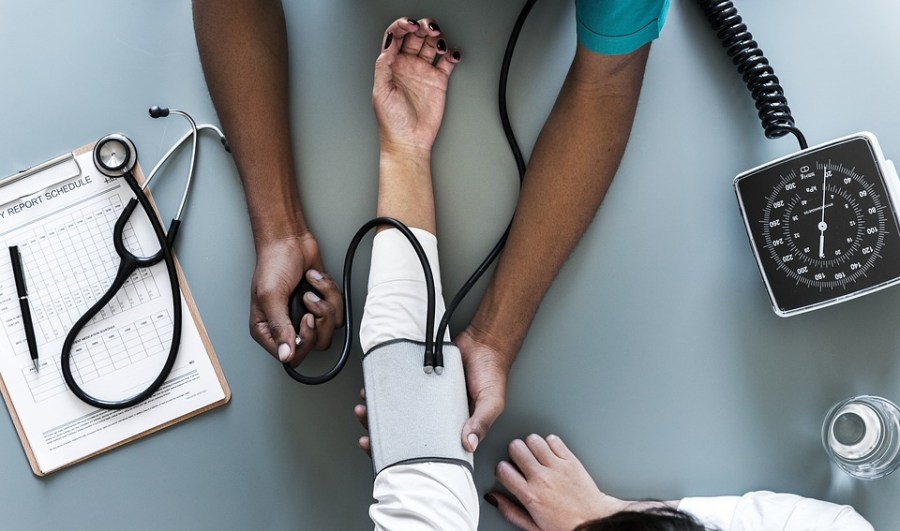
Most of us have experienced having our blood pressure taken, as it's standard practice in virtually every medical provider's office, from an optometrist to a general practitioner. This is done because blood pressure is the primary indicator of hypertension, which is one of the single biggest risk factors for coronary heart disease (CHD).
According to the Centers for Disease Control and Prevention (CDC), CHD is the most common type of heart disease, killing more than 370,000 people annually in the United States. Heart disease is the leading cause of death for both men and women. Having high blood pressure puts you at risk for heart disease and stroke, which are leading causes of death in the United States.
These sobering statistics mean you should take or have your blood pressure taken regularly. Often. Resources are available online to help you learn more about high blood pressure, including charts that show blood pressure readings in normal, high and low ranges for all ages.
You May Be at Risk
Even if you feel perfectly well and healthy, you could still be at risk for high blood pressure. Many people are not aware that they have high blood pressure, which is also known as hypertension, until they have a cardiovascular event such as a heart attack or a stroke.
That is precisely why high blood pressure is called the silent killer. It can be present and not manifest until a cardiovascular event occurs. This is another reason why you should take care of your health with regular check-ups. You can also take advantage of blood pressure checks that are often offered free of charge at community health centers, drugstores and other public health centers. If your blood pressure is high, you may have a serious health condition. Educate yourself and discuss what is an appropriate blood pressure reading with your physician.
If you have high blood pressure, you are not alone. The CDC notes that about one-third of American adults have pre-hypertension, which is elevated blood pressure numbers that are higher than normal but not yet in the high blood pressure range.
Notably, only about half of people who do have high blood pressure have their condition under control. Often, this is accomplished with medication, but can also be helped or accomplished with changes in diet and lifestyle. For example, people who have high blood pressure usually are advised to cut their salt intake, limit alcohol and exercise regularly. Weight loss can also be helpful, as can reducing stress through activities such as yoga and meditation.
Basics of Readings
Your total blood pressure reading is determined by measuring your systolic and diastolic blood pressures, according to the Mayo Clinic website. Systolic blood pressure (the top number), measures the force your heart exerts on your artery walls with each beat. Diastolic blood pressure (the bottom number), measures the force your heart exerts on your artery walls between beats.
Blood pressure readings fall into four general categories, ranging from normal to stage two high blood pressure (hypertension). The level of your blood pressure determines what kind of treatment you may need. To get an accurate blood pressure measurement, your doctor may want to evaluate your readings based on the average of two or more blood pressure readings at three or more office visits, according to Mayo experts.
Interpreting Your Readings
Many blood pressure charts online walk you through how to understand your blood pressure, indicating a range of readings and what category they mean. For example, if your systolic reading is below 120 and/or your diastolic reading is below 80, you have normal blood pressure and you should maintain or adopt a healthy lifestyle. If your systolic reading is 130-139 and/or your diastolic reading is 80-89, you may have stage one high blood pressure. You should then maintain or adopt a healthy lifestyle and talk to your doctor about taking one or more medications. Blood pressure readings apply to men and women in the same ways.
Blood Pressure and Seniors
The guidelines we've outlined apply to the general population. If you are a senior, your high blood pressure threshold may be different, according to Aging Care. Some guidelines suggest that people age 60 and older aim for a reading below 150 over 90. But it is vital to discuss this with your physician, as each person's health needs and circumstances are unique.
If you have any questions about high blood pressure or if you have questions about any treatment you are receiving for high blood pressure, contact your health professional.
MORE FROM LIFE123.COM
Source: https://www.life123.com/article/guide-to-understanding-high-blood-pressure?utm_content=params%3Ao%3D740009%26ad%3DdirN%26qo%3DserpIndex
Posted by: macafeeautumnayes.blogspot.com

0 Komentar